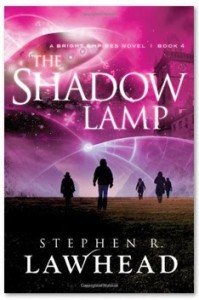
by Jason Joyner | Jan 22, 2014 | Blog, dystopian, Jill Williamson, Outcasts, reviews, speculative fiction, young adult
 Hey-o boys and femmes!
Hey-o boys and femmes!
It’s day 2 of our featured book, Outcasts by Jill Williamson, the second in the Safe Lands series. Yesterday I recapped book 1, Captives.
What about Outcasts? Does it avoid the sophomore slump? Is it another Empire Strikes Back?
The story follows the remnant of Glenrock, a village that survived the thin plague but stayed out of the walled, totalitarian Safe Lands nearby. In Captives, they were forcibly taken into the Safe Lands.
Levi, the oldest brother who had to take over eldership of the Glenrock remnant, is hiding out in the underground with his group. He’s working with Rebel leaders, but he doesn’t know if he can trust them with his people. They have their own agendas, and it may not be what Levi thinks.
Mason, the middle brother, continues to work and act as an undercover spy for his people. He’s trying to get information out of Ciddah, the head medic he works for. His heart is betraying him, but what if she betrays him first.
Omar is the youngest brother who opened the door for the Safe Lands enforcers to come to Glenrock. He regrets his actions and tries in his own way to atone for them, but his addictions developed from the Safe Lands hinder his progress.
Together they need to free the Glenrock children from the boarding house before they can find a way out of the Safe Lands. But with powerful enemies and questionable allies, will they survive or will they be caught and prematurely liberated from this life?
Jill Williamson is a dynamo of a woman. She is full of energy and imagination in real life, and it shows in Outcasts. There are tons of fun touches in the futuristic world that make the Safe Lands come alive. There are many futuristic novels out there to compete, but Jill puts a unique spin on many things. The reader will enjoy making connections with some of our real life items and how they develop in the future.
As Becky Miller pointed out in her first post, Outcasts deals with real life issues head on, from drug addiction to sexual desires, but it is all handled in a realistic and honest fashion without glamorizing any of it. The negative consequences of vices are clear, but not in a preachy manner. This book has ideas that give it a heft that some other books miss in dealing with teens and twenty-somethings. The characters anchor these ideas, as they wrestle in different ways with the issues. Omar gave himself over to pleasures that he realizes is damaging, but he has a hard time getting past them. Some of the consequences come out at very inconvenient times, which keeps the plot twisting. Meanwhile Mason, the reasonable brother, still deals with some real temptation.
Overall the book is a very enjoyable read. There are a few sequences where a lot of characters are doing things and it gets confusing for a little while. The book is the second in a series, so there are things that a person would be confused about if they started with Outcasts. The solution is simple – get Captives and read it first!
Becky Miller has all of the posts from the tour updated on her blog. Be sure to check them out, and I’ll be talking a little deeper about the book tomorrow.
—
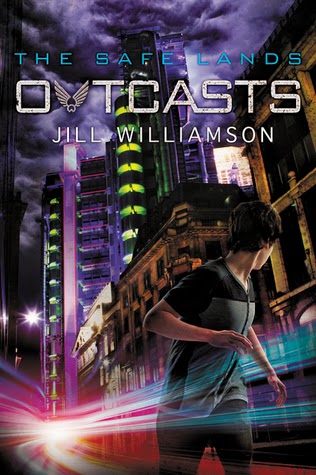
by Jason Joyner | Jan 20, 2014 | Blog, CSFF, dystopian, Jill Williamson, speculative fiction, writing craft, young adult
Hey-o boys and femmes. Welcome back to the Christian Sci-fi and Fantasy blog tour, where the best in Christian speculative fiction is highlighted.
 This month we’re featuring the book Outcasts by Jill Williamson. It is the second book in the Safe Lands series.
This month we’re featuring the book Outcasts by Jill Williamson. It is the second book in the Safe Lands series.
In the first book, Captives, we learn about a post-pandemic America. The Safe Lands is a walled city that has survived and has developed its own culture and lives by the philosophy of “find pleasure in life.” The problem is that they can only control the thin plague – they can’t cure it. And it is making their women sterile.
Glenrock is a village that exists outside the Safe Lands and lives in a much more rural existence. The villagers have a patriarchal society, continue to fellowship with God, and do things on a natural level.
When leaders from the Safe Lands decide to ask Glenrock to join them to help with their fertility issue, they assumed the villagers would want to join for the benefits of technology. But the plan goes awry and many villagers are killed.
Three brothers, sons of Papa Eli, must make their way in the Safe Lands. Eldest Levi has the mantle of village elder and wants to rescue his people from their clutches.
Mason was trained as a healer in the village, and now is placed in the medical system of the Safe Lands and looks for a way to not only save his people, but stop the thin plague as well.
Omar, the youngest, delivered his people to the Safe Lands in exchange for power and prestige, things he couldn’t accomplish on his own in the village. However, his acceptance of Safe Land life will come with a cost.
Captives starts an intriguing young adult trilogy with adventure and thought-provoking commentary on our modern life. I’ll talk about Outcasts in a later post.
For more information, you can check out my prior posts on Captives. The folks below will be discussing Outcasts during the tour as well, and Becky Miller is our tour master and will update with all the latest.
Red Bissell
Thomas Fletcher Booher
Beckie Burnham
Pauline Creeden
April Erwin
Victor Gentile
Ryan Heart
Timothy Hicks
Julie Bihn
Carol Keen
Shannon McDermott
Meagan @ Blooming with Books
Melanie @ Christian Bookshelf Reviews
Rebecca LuElla Miller
Joan Nienhuis
Nissa
Jalynn Patterson
Writer Rani
Chawna Schroeder
Jacque Stengl
Jojo Sutis
Steve Trower
Phyllis Wheeler
Deborah Wilson
—
Legal mumbo-jumbo: In conjunction with the CSFF Blog Tour, I received a free copy of this book from the publisher.
—-
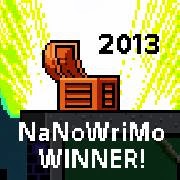
by Jason Joyner | Dec 11, 2013 | Blog, NaNoWriMo, writing, writing craft, Writing Wednesday
 |
| Lookit what I won. |
In 2011 I wrote a post entitled, “Why I Don’t Do NaNo.”
NaNoWriMo, to the uninitiated, is the National Novel Writing Month. Each November writers are encouraged to plant the butt firmly in chair and crank out a 50,000 word novel. It’s been going on for several years now, and it always brings out a lot of excitement in writer circles.
In 2011 I talked about how it didn’t work for me when I tried it a couple of times. It was good for some people, but didn’t work for everyone, and I was one of those writers.
Fast forward to 2013.
Facebook was buzzing with my writer friends saying how they were going to disappear for the month because of NaNo. The excitement was palpable. Just because I said I wasn’t going to do it, I felt a pang of missing out.
Man, they were going to have all this fun.
Then on October 30, I thought, why not? I can try it again. If I get a few thousand words out, it’s more than I would have had if I weren’t writing. My main project was under going another round of revisions, so it was out of consideration.
But there was this new idea I’d been composting for a while. I even got to do some brainstorming on it with Jill Williamson on our flight back from the ACFW writer’s conference in September. Would the new idea hold water? NaNo seemed like an opportunity to play with it and see what could happen.
I jumped in.
For the first week, I kept up pace. A writer has to average 1667 words a day to finish the 50,000 on time. Then life started interfering and I fell off. Well, at least I had some words down.
Except I had a taste of success. Circumstances worked out. I kept plugging away.
By November 28 I had three days left and 10,000 words to go. Could I do it? Facebook friends were now cheering me on. My wife succumbed agreed to let me have time over the holiday weekend to hit the keys.
And on November 30 I clocked in at 50,077 words.
So, this is partially a self-indulgent, congratulatory post. Whoo-hoo, I did it!
But I also learned some things about writing.
I learned how to push for a deadline. My first novel was written over seven years. No sense of urgency there. Now I knew I could be dedicated and churn out some significant production if challenged.
I was able to explore a new idea. Obviously the first draft of everything is mostly crap, but it forced me to work through some plot points, and there are a few keepers in there. Of course, the chapter where I was stuck and decided to interview one of my characters for “word count” won’t make the final cut. But I learned things about Demarcus that I can use later on. It’s all good!
Having a minimal outline helps. I was drowning for a bit until I brainstormed a few plot points to get me out of a bunch of conversations over food. Even when one of the points was, “something bad happens now,” it helped me have enough structure to push forward.
I went from doing 1000 words on my best day to 5200 words. Again, they came fast and furious, and I hope they at least make complete sentences, but I got them out. Now the revision scalpel can come out.
So to me in 2011 – you were wrong. You can do NaNo, and with the right circumstances it does help you out. But enough of the blog post – you’ve got revision to do. Get cracking!
—
Have you done NaNo? What was your experience? Please share in the comments below.
—
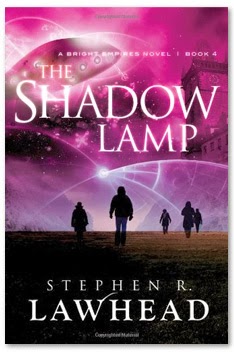
by Jason Joyner | Nov 14, 2013 | Blog, Bright Empires, CSFF, reviews, speculative fiction, Stephen Lawhead
In Which The Butter Is Stretched Too Thin Over The Toast
Hello again CSFF Tour fans. The monthly focus on Christian speculative fiction is wrapping up on the fourth book of the Bright Empires series,
The Shadow Lamp by
Stephen Lawhead. Yesterday I did
a brief recap of the other three books so far.
This link will take you to all of my prior posts on the Bright Empires series.
Lawhead said this was an ambitious series for him and that he didn’t think he could write something like it earlier in his career. Now he was at a point that he could wrestle it.
Out of four rounds so far, the score card for this fight would be Lawhead 3 to 1. Unfortunately, The Shadow Lamp misses the mark in comparison to the other books.
It is a major challenge to find a story that can stretch for a trilogy, much less five books. There has to be enough conflict and high enough stakes to carry a reader through to the end.
The Bright Empires series has a significant crisis to solve by the end of book five – the potential destruction of the universe. So that’s something.
The problem with book four is that it became too much of a set up story. There is a lot of shuffling the pieces to get them into the proper position. However, the stakes do not often grab the reader and make them care enough about what happens.
For instance, Lady Fayth and her loyal manservant Giles separate from the main group of heroes and get lost in an unknown dimension. There are harrowing circumstances, but the reason for their departure and the subsequent trial is nebulous. I shrugged my shoulders. Okay, why did that happen?
There are numerous plot points swirling around from the various players trying to figure out ley travel through dimensions for their own purposes. Some of them explain some background or seem to be moving somewhere, only to fizzle out. Maybe there is more to the story of Douglas, or the pirate attack suffered by the Burleigh men, but the significance was lost to me.
There were also two gatherings where educated people talked. A lot. They set up the huge consequences that happened in the prior book and pointed to the final act, but there wasn’t much action or development within The Shadow Lamp itself.
The writing quality was still well done. Lawhead is so good at description and setting from his research and experience. I’m invested enough in the story that I will see it through to the end. I have faith that the last installment will be worth following this series for five years from when it released to its conclusion next year. But The Shadow Lamp will be the filler episode that is quickly forgotten in the midst of the other books.
One other factor has been discussed elsewhere in the tour, but Lawhead has discussed a little more theology in books 3 and 4 over the first two books.
I could see the seeds he planted and was excited about the firstfruits revealed in The Spirit Well. But in The Shadow Lamp, he takes the mythology he’s created for the story regarding time and the idea of the multiverse and places it against the nature of God, in my opinion. Basically, if the heroes don’t fix things, the timestream will collapse on itself and destroy everything.
I don’t have a problem with a big cataclysm in a book – the bigger the stakes the better, usually. Like bacon. You can’t have too much bacon. But I digress.
The issue is when this can happen despite God. That’s what it sounds like could happen. Maybe I’m wrong, or maybe he’ll clarify things in book five. Until then, my opinion was that this particular point is a detraction to the whole.
So, the take-home point? The Shadow Lamp is not a bad book. It’s just not very memorable. It is by no means a deal-breaker in reading the Bright Empires series. My experience with Lawhead is that he can be a streaky writer. Some of his books have been my favorites. And some…not so much. Unfortunately The Shadow Lamp will stay in the shadows of my memory when all is said and done.
—

by Jason Joyner | Nov 12, 2013 | Blog, Bright Empires, CSFF, speculative fiction, Stephen Lawhead, The Shadow Lamp
In Which The Blogger Gets A Hand Cramp By Trying To Keep It All Straight
Hey, the CSFF Tour is continuing the focus on The Shadow Lamp, the fourth book in the five book Bright Empires series by Stephen Lawhead.
Lawhead is a prolific fantasy author with 24 books to his name. He’s written about the Crusades to Robin Hood, from Byzantium to a Celtic fantasy land, an Arthur series and kids books. Now he calls Bright Empires his most ambitious work yet.
It’s hard to bring together four different books into three short blog posts. But, that’s my task today.
Here’s a very quick run-down of the previous books.
The Skin Map – This kicks off the adventure by introducing us to Kit Livingstone, the main character who has inherited his family’s skill of ley travel, the journeying between dimensions of the multiverse. Except he’s not very skilled at it. He loses his girlfriend Mina in 16th century Prague, ends up betrayed and left to die in an Egyptian tomb, only to be rescued by said Mina, who is a quicker study than her boyfriend. It turns out a lot of people are looking for the Skin Map, a map made of the skin of Arthur Flinders-Petrie, a man skilled at ley travel who tattooed directions on his own skin using strange symbols as code. Guess he won’t lose that map…
The Bone House – Now there are more stories bouncing back and forth in time. We learn the origin of the villainous Lord Burleigh, who was the bad guy in the previous book. Arthur is looking for a way to save his wife. Kit and Mina try to dodge Burleigh, and Kit being Kit gets stranded in the Stone Age and ends up in a Bone House. Funny how that worked out…
The Spirit Well – Now Kit stumbles on a way out of the Stone Age and is reunited once again with Mina. A new traveler, Cassandra Clarke, an American paleontologist, has fallen through time and has been found by the Zetetic Society, a group dedicated to ley travel and watching out for good. If everyone could just find the blasted Skin Map, everything would be alright. Of course, there are different folks with their own agendas weaving through time. And one traveler might just have broken the universe…
Whew. There’s a lot to chew on there. Lawhead is a skilled writer and researcher. He travels widely and is very good with the historical detail, so the various locales are very intriguing. He writes in a slightly detached style giving the book a subtle whimsy and British feel. So far, very good. Like he says, the books are unique in the speculative fiction field.
If you want to see all of my posts on the Bright Empires series, here’s the link to all the tags. Fittingly, like the narration in the series the posts don’t necessarily come in order. You can also go to Stephen Lawhead’s Facebook page or author page. Finally, Becky Miller is our tour guide, and she gathers all the posts together here from all of the participants. I’ll have my review of The Shadow Lamp tomorrow.
Of course, if you can figure out time travel, you can read it right now.
—
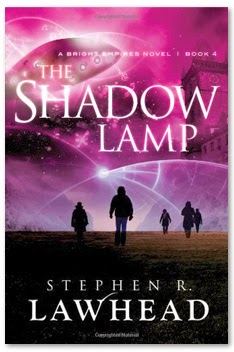
by Jason Joyner | Nov 11, 2013 | Blog, Bright Empires, CSFF, speculative fiction, Stephen Lawhead, The Shadow Lamp
In Which An Old Friend Comes Back To Visit, So To Speak
Welcome back to the CSFF Tour. The best in Christian speculative fiction comes through this great resource. And this month, I had a chance to read the book!
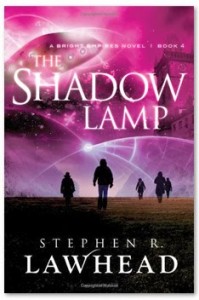 I am excited to participate because we’re featuring the latest in the Bright Empires series, The Shadow Lamp by Stephen Lawhead. This is the fourth book in the series, so we are quite familiar with the comings and goings of the various characters. Well, that might be generous.
I am excited to participate because we’re featuring the latest in the Bright Empires series, The Shadow Lamp by Stephen Lawhead. This is the fourth book in the series, so we are quite familiar with the comings and goings of the various characters. Well, that might be generous.
The Bright Empires series deals with a peculiar feature – the ability to travel through the multiverse by an intriguing feature known as ley lines.
An Englishman named Kit Livingstone was living a rather uninspired life until his great-grandfather Cosimo introduced him to the family business of traveling to different dimensions.
After trips to 16th century Prague, a Stone Age hunter-gatherer camp, and an escape from an Egyptian tomb, Kit has gathered with some friends. His girlfriend Mina, the Italian priest Gianni, and the American paleotonlogist Cassandra are on the verge of a major discovery. If only they had their shadow lamps to guide them in the treacherous dangers of ley travel.
Because the journey to find the Skin Map, return to the Bone House, and discover the mystery of the Spirit Well has already claimed many lives. Oh, and it might be threatening the fabric of all creation.
For more information, you can go to Stephen Lawhead’s Facebook page or author page. Also, the fine folks below are joining in the discussion, so check them out as well.
Julie Bihn Red Bissell Thomas Clayton Booher Thomas Fletcher Booher Beckie Burnham Jeff Chapman Karri Compton Theresa Dunlap April Erwin Timothy Hicks Christopher Hopper Becky Jesse Becca Johnson Jason Joyner Carol Keen Rebekah Loper Shannon McDermott Meagan @ Blooming with Books Rebecca LuElla Miller Mirriam Neal Writer Rani Nathan Reimer Chawna Schroeder Jojo Sutis Rachel Starr Thomson Robert Treskillard Steve Trower Rachel Wyant Phyllis Wheeler Deborah Wilson
In conjunction with the CSFF Blog Tour, I received a free copy of this book from the publisher.
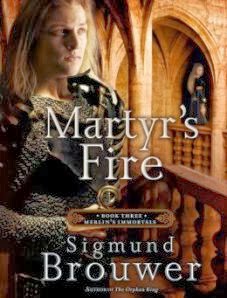
by Jason Joyner | Oct 23, 2013 | Blog, CSFF, fantasy, speculative fiction
Hey. Is it that time again?
Yes it is. Time again for the Christian Sci-Fi and Fantasy Tour. Speculative fiction at its finest.
This month’s feature is Martyr’s Fire by Sigmund Brower. This is the third book in the Merlin’s Immortals series. The Orphan King and Fortress Of Mist are the two previous books.
From Amazon:
 Will this dangerous quest lead the outcast Orphan King toward an ancient secret—or to certain destruction?
Will this dangerous quest lead the outcast Orphan King toward an ancient secret—or to certain destruction?
Posing as a beggar, Thomas escapes Magnus after fifteen men, who are calling themselves the Priests of the Holy Grail, arrive and take control of the castle through wondrous acts and apparent miracles. With the help of his longtime friend Gervaise, Thomas sets out on a journey that leads him to the ancient Holy Land. Unaware that Katherine and Hawkwood are watching over him, Thomas is tested in his beliefs and comes face to face with the ancient power that the Merlins and Druids have long been searching for.
Enter the world of Merlin’s Immortals, where ancient secrets and evil conspiracies take you on a breathless adventure of discovery, intrigue, and hidden knowledge.
—
I didn’t get this book, but there are people below who have and can give you more info on it. For a summary of all of the posts of the week, check out Becky Miller’s post for the latest and greatest.
Red Bissell Beckie Burnham Theresa Dunlap Emma or Audrey Engel April Erwin Victor Gentile Nikole Hahn Becky Jesse Carol Keen Krystine Kercher Rebekah Loper Jennette Mbewe Amber McCallister Shannon McDermott Meagan @ Blooming with Books Rebecca LuElla Miller Writer Rani Nathan Reimer Jojo Sutis Steve Trower Phyllis Wheeler Deborah Wilson Rachel Wyant
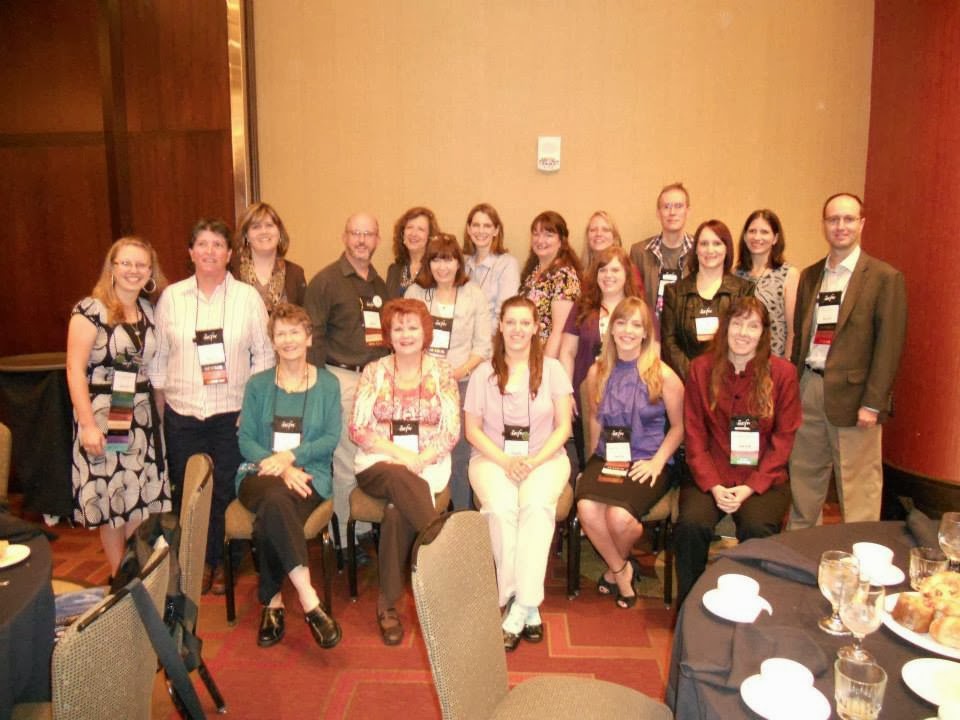
by Jason Joyner | Sep 26, 2013 | ACFW, Blog, conference, writing craft, Writing Wednesday
That was fast.
The 2013 ACFW Conference in Indianapolis has come and gone like a blur. It seems only a few days ago I was talking about the 2012 conference in Dallas. Sheesh.
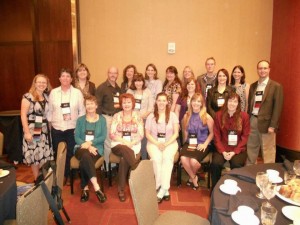 |
| The Northwest writers. |
You might wonder what happens when 580+ writer types gather in one place like that. Being a guy who likes speculative fiction, I could say that it tears into the space/time continuum, but that might be a little exaggeration.
If you are serious about writing, going to a conference is a great thing to do. You are around other creative types that understand the process, the joys and battles of it all. There are great opportunities to learn the craft and meet people to encourage and help you along the way.
For those who have gone to ACFW and couldn’t make it this year, you were missed. The conference filled up due to a lower capacity at this hotel. It was nicer than Dallas in that we were downtown, so it was possible to get out and about.
I’m proud to belong to a group like ACFW because of the fellowship in Christ we also share. It isn’t every conference where you find a couple of writers huddled in a corner discussing plots or future plans and then bowing heads to pray about the things shared. That is a special part of ACFW that is a real benefit to Christian writers.
I have some friends that want more details. Here’s a running list, and feel free to contact me if you have questions about anything here.
*I didn’t know much about Robin Jones Gunn, the keynote speaker, but she was a joy and such an encouragement. She spoke like a true storyteller and helped put things in perspective for all of us. I think she was exactly the person needed there.
*If you can go to a James Scott Bell lecture or workshop, do it. There’s a reason he is spoken of so highly in writer circles for the craft. He presents so well and lays out the tricks and tips he’s learned in such an entertaining and helpful way. I’ve read his book Plot & Structure, but this brought it home even more. The only downside is that it was a full-day workshop, so I had to miss out on some other interesting possibilities.
*I need therapy now thanks to Tosca Lee. She presented a class on making unsympathetic characters sympathetic. She had us write about betrayals, loss, fears. I thought I had dealt with those issues, but she dredged them all up. Actually, this was quite helpful in making my bad guy better.
*Storytelling games with speculative fiction writers beats all. Just sayin’.
*Leave it to Peter Leavell to get one hooked up with the cool crowd.
*The costume night was a big hit and a very smart, diplomatic move by the conference organizers. No one got kicked out this year! Good job Robin and company.
*Pitching to agents and editors was much easier the second time around. Though I still wish I would have brought chocolate as a bribe. Just in case.
*I would like to see some way to gather and encourage the men at ACFW. We are outnumbered by far and I think it would be a boost to have some fellowship in some way.
*There is still a lot of talk about traditional publishing vs. small press vs. self-publishing electronically. The issue is big and is still in a lot of flux. Check out Rachelle Gardner’s ebook for the same content she shared in a class there.
*There are a lot of creative people out there who love the Lord. I pray we all look to see how best we can serve Him and others with our gifts. Perhaps some of us should be broader in scope – finding ways to reach out to the general market or provide quality stories with heart that prepares the way for their readers to be more open to the spiritual.
*The elevators were a great place to meet and greet. Sometimes we got really close on the elevators. Seeing as there were only four and the stairs weren’t handy.
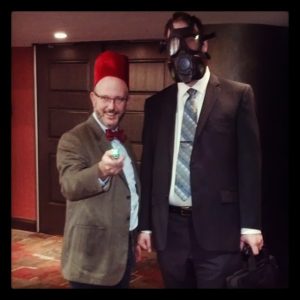 |
| “Are you my mummy?” |
It was a great time, and despite some last minute doubts, this conference turned out better than last year for me at least.
And yes, I’m wearing a fez. Fezzes are cool. (Bonus points for the reference there).

by Jason Joyner | Sep 19, 2013 | Blog, goofiness, pirates, Talk Like a Pirate Day
Arrr, yeah!
It be that favored holiday of this here blog, International Talk Like A Pirate Day. For years Spoiled For The Ordinary has championed September 19th as a high day of silliness and pirate-y things. This year be no exception.
For today only, get the excellent pirate novel Pirate Hunter by Tom Morrisey free on Kindle, Nook, or whatever preferred vessel o’reading ye have.
Here be some other fine pirate tales from the master story-teller George Bryan Polivka. This blog has featured these tales before as well.

The Library of Congress has some excellent reading for you scurvy dogs that can actually read.
I may not fancy these Buccaneers, but anyone who has a pirate ship in their stadium is a salty dog.
And these rascals of the Seven Seas ‘ere not to be trusted. They make break out in brawlin’ or a piano duet at any time. ARRR!

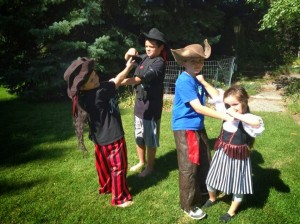

by Jason Joyner | Aug 28, 2013 | Blog, rules schmules, writing craft, writing rules, Writing Wednesday

As an aspiring writer, there are rules of fiction that I must live by. Show, don’t tell. Stick with one point of view a chapter. Don’t use passive voice. Kill all your adverbs.
All of these rules are very helpful for writers. They become rules because they do help books sound better. They help a writer.
However, there’s a backlash going on in the writing world. People are starting to ask question about the rules.
Jeff Gerke is a writing teacher, author, and publisher. On Facebook,
he started a discussion about the writing rules out there because he wants to write a book about the rules. In his book
Write Your Novel in a Month he argues that the only rule that can’t be broken is to be sure to engage the reader.
Finally, Rachelle Gardner, a respected agent with one of the top writing blogs, just talked about the rules being tools overall. They can help when a book isn’t working, but if it works to break a rule for the situation, then it’s okay.
This has helped me a lot. I know that I need to listen to advice from those who have experience. But I’ve also gotten conflicting advice. I got knocked off my groove for a couple of months after some bad feedback from a writing contest. Now I’m getting back into it and I’m realizing that I need to serve the story overall and use the rules as those tools, not as a bludgeoning hammer to force something into place.
I’m thankful for these people speaking up about the rules being more, well, guidelines to steal from a certain pirate captain. Hopefully my writing friends can be encouraged in the same way.
SO: any writing rules you’ve run across that have been used against your writing that really needed to be broken? Share them here and I’ll pass them on to Jeff Gerke for his book.
—
P.S. Did anyone notice the writing rule I broke in the first sentence?
—
P.S.S. Can you believe I’ve finally gotten a Writing Wednesday post out?
—




